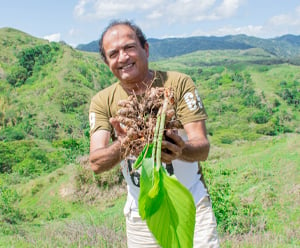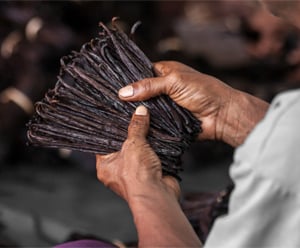
Global connections bring clean waters to the Democratic Republic of the Congo

For many, accessing safe, drinking water seems like a given, and the United Nations considers it a universal human right. But, unfortunately, for the people from the Democratic Republic of the Congo (DRC), access to drinking water is sorely lacking.
Despite having the largest freshwater resource in Africa, the DRC suffers from an acute drinking water supply crisis. Only 40.4 percent of its urban population and less than 1 percent of its rural population have access to drinking water on premises due to the lack of water infrastructure.
For instance, in July 2021, an Angolan diamond mine leaked large amounts of polluted water into the Kasai River Basin, poisoning the rivers in Tshikapa. The leak killed off much of the river’s aquatic life, impacting the river-dependent communities, and a ban on drinking the water from the Kasai and Tshikapa rivers was put in place.
With Tshikapa’s lack of natural springs, and the Congo River far out of reach, the limited access to drinking water for the populace has become a huge problem.
Enter Keep Smiling, a non-profit organization that has been tackling the DRC water crisis since 2018. Consulting with well-drilling and engineering veterans, local partner associations as well as getting some help from DHL, Keep Smiling is making a difference by drilling new water wells in Tshikapa.
Leveraging expertise from all over the world
First founded in 2014 by Torsten Braun and his colleagues to help people in the aftermath of typhoon Hayan in the Philippines, Keep Smiling has been focusing on the water crisis in the DRC since 2018.
“Water is the start of a better life,” said Torsten Braun, the founder of Keep Smiling. “With clean water, the people in DRC can take care of their personal hygiene. They can spend their time working without worrying about cleaning dirty water, and illnesses they don’t have medical care for. It opens up a new level of opportunities for them.”
To that end, Keep Smiling set its sights on drilling new water wells in Tshikapa to provide access to clean drinking water. Putting together a drilling rig, however, was a herculean task. In early 2019, Braun’s team got in touch with a drilling rig producer in Germany but was told their equipment would not be a good fit for their operation.
“We needed something robust yet really easy to handle,” explained Braun.
Luckily, the German producer connected the team with a company in Thailand, where they met Peter Ball, an English engineer with 40 years of drilling experience. Over a series of calls and emails, Ball advised the team throughout the project, becoming the team’s expert in drilling. “Peter took a lot of time and effort to help us find the best rig and equipment and educate us on the science and logistics of water and drilling,” noted Braun.
Through Ball, Braun’s team connected with a geophysics expert in Nigeria, who surveyed the area and trained the team to utilize the geophysics equipment. By considering the structure of the rocks and the coast, the team calculated the precise points most likely to have access to drinking water.
Working with their local partner association, Budikadidi, the Keep Smiling team tapped into their understanding of the Tshikapa community and worked with their experts to design a map of 15 potential water well drilling spots in Tshikapa.
However, when Covid-19 hit, the Keep Smiling team faced further challenges as it became much harder to source donations and funding.
To raise funds for the project, the Keep Smiling team started a water march, walking more than 200 kilometers through a forest in Germany, drinking only water from natural springs for six days. The march received significant media attention, allowing Keep Smiling to garner enough publicity to fund the water well project, and also brought along unexpected help.
“That was a breakthrough in our campaign because, besides the funding we received, a pump company we approached offered us help,” said Braun, who added that the expert from the pump company helped the team curate and design a strong setup for the rig.
With the help of their drilling industry experts, plans were well underway for the Keep Smiling team to start drilling for wells. The only thing they were missing was equipment.
Adapting to supply chain disruptions
Gathering the drilling equipment, however, was a long and tedious process, as the pandemic created multiple supply chain challenges, hence delaying the project.
The team had to transport equipment from Thailand, comprising a drilling rig, drilling pipes, and an air compressor. They were also expecting equipment from the U.K., which included 14,000-liter water storage tanks as well as sustainable solar-powered pumps, solar panels, cables, controllers, and water distribution taps ordered and delivered in Germany.
“We had about 10 different suppliers for our equipment, which meant multiple stakeholders to coordinate with,” noted Braun. While some suppliers were delayed, others had storage capacity issues and urged the team to pick up the equipment they ordered from the warehouses.
To navigate the onerous logistics process, Keep Smiling reached out to DHL to arrange their shipments. The equipment purchased from Thailand was first sent to Germany, arriving in Hamburg in a 20-foot container. The DHL Global Humanitarian Logistics Competence Center team then redirected the shipment to a small village in South-West Germany called Maikammer, where a local winery freed up space for the Keep Smiling team to store and consolidate their equipment. When the equipment arrived, the team repacked them in a 40-foot-high container to be shipped to the DRC.
But the team had to navigate yet another challenge in packing the container. “None of us had any experience loading a container, and we had no idea how we would pack so many different equipment of different dimensions safely,” said Braun.
Fortunately, a Keep Smiling team member, who was experienced in woodworking, came up with the idea of building an internal structure within the container to pack the equipment securely and safely.
Making the trip from ocean to land
With the last stretch in sight, Braun expressed his relief at how an experienced logistics team made the move so much easier.
“The DHL team kept us updated, answered our questions patiently, and that made the admin and paperwork a lot easier to digest,” said Braun. He added that the DHL Global Humanitarian Logistics Competence Center team took over the customs administrative formalities and helped Keep Smiling clarify its status as a non-profit organization to engage a tax-free solution for their shipment.
With guidance from the DHL Global Humanitarian Logistics Competence Center team, the shipment found its way from the port of Hamburg to the Matadi port in the DRC. From there, the container traveled 1,188 kilometers to Tshikapa via road freight.
The journey to Tshikapa was challenging as many of the DRC’s roads are not well-developed, with 15,000 kilometers of unpaved roads, and only 3000 kilometers of paved roads. It was also risky during the rainy season when there were high chances of trucks getting stuck on muddy roads.
But eventually, the equipment finally reached the destination site, where it was unloaded and assembled by the Keep Smiling team.
Water changes lives
After four years, the project came to fruition when Keep Smiling successfully drilled the first wells in Tshikapa in December 2022.
To maintain the wells, Budikadidi has trained two locals on how to clean the water filters and maintain the operation of the water distribution system. Plans to build the water storage tank are well underway, as is a future project to treat the water with UV Light.
Still, there is a lot of work left to be done. Local acceptance of the water well system and additional equipment are essential for the distribution to other areas.
Despite creating new water sources, Braun noted that the women in Tshikapa still transport water over long distances to bring it home to their families. “For us, that drives home how crucial it is for clean water to be closer to the people,” he said.
With a population of over 300,000 people in the area, Keep Smiling hopes to continue expanding its water distribution to other areas. The aim is for each water well source to supply 25,000 liters per day in each area, providing five liters of water for 5,000 people daily.
As the water well’s operations have gone smoothly for the first month, Peter Ball, the project’s lead engineer, holds high hopes for the water crisis in Tshikapa to improve.
"What the team has done is help Tshikapa make the jump to self-sustainability in one borehole,” said Ball.
For Braun and Keep Smiling, building the right connections was the key to the project’s success.
“People were really our biggest resource,” said Braun. “We started this project with a lot of passion but no expertise. Without the right people supporting us in driving this project, we wouldn’t have been able to proceed because the technique and knowledge required, the culture, the way things are designed, and the structures and measures implemented in DRC are so different. We were fortunate to have found experts at every turn.”
MORE FROM THIS COLLECTION



















 English
English